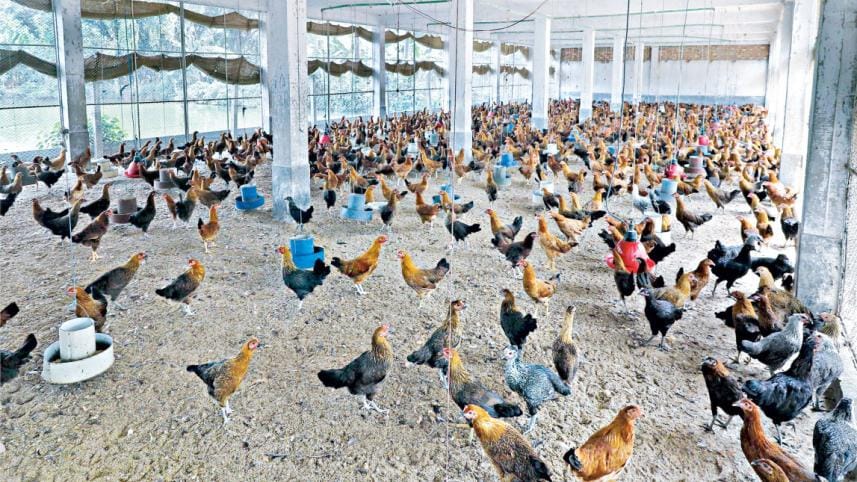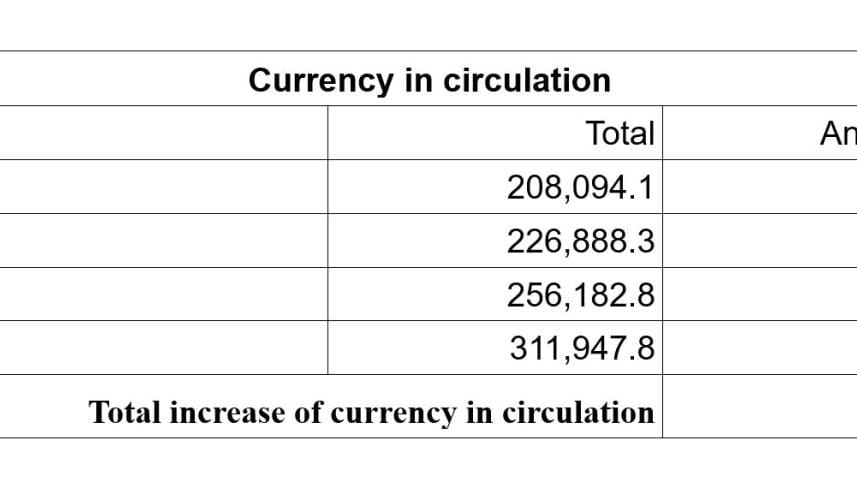The poultry industry became the scapegoat of inflation

For the past few years, Bangladeshi consumers have suffered terribly due to price inflation. Ministers and members of parliament of the previous government relentlessly blamed "syndicates" for increasing the prices of chicken, eggs and other foods. Regulatory bodies like the Bangladesh Competition Commission subsequently ordered several large poultry companies to pay fines. These orders were stayed by the High Court; but this sequence of government actions culminated in the Department of Agricultural Marketing dictating ceiling prices for eggs and chicken. In any industry, ceiling prices tend to discourage further investment and may become counter-productive: without plentiful investment and expansion of production and supply, prices tend to remain high.
Absent from the above events was a real economic analysis of why the inflation occurred. Yet inflation is an economic phenomenon with well-understood causes, and it's worth looking at these.
The first possible cause of price rises is a shortage. Whenever there's a shortage of any good, consumers who want it bid up the market price. Economists call such inflationary shortages "supply shocks." In fact, the start of the Ukraine war in 2022 caused an international shortage of both grain and fuel as export of these from Russia and Ukraine were disrupted. Expensive maize and soybeans made poultry feed, fish feed, and cattle feed more costly. Thus, there was an element of supply shock inflation in 2022, which was not the result of syndicates but of the Ukraine war.
The second possible cause of inflation is a bit more technical; all prices rise when there's too much money being printed by the government. Money is exchanged for goods; so, when there's excess money, the value of money goes down, and the prices of all goods increase. For example, if the money circulating in Bangladesh suddenly increases by 50 percent, the price of an egg could be expected to rise from Tk 8 to Tk 12. This is monetary inflation, and it's also not caused by syndicates, but by economic mismanagement. Monetary inflation happens when a government spends more than what it receives in taxes, and decides to fill the gap (technically called the budget deficit) by irresponsibly printing money.
In published data, there is strong evidence that the AL government printed money irresponsibly. The following figures are found in the Monthly Economic Trends dated October 2024, published by the Department of Statistics of Bangladesh Bank.

What we see is that the total increase in currency in circulation was 44 percent over only three years (quite close to the 50 percent of the earlier egg price inflation example). So as per our earlier egg example, we might indeed expect a Tk 8 egg to rise close to Tk 12 over this period. In fact, this is more or less what happened. At the same time, prices of many other commodities including rice and vegetables also went up over the last few years. This widespread price rise across many sectors further indicates that the cause was monetary inflation. Effectively, the government printed money, which caused price to rise and made all Bangladeshis poorer.
Why would the previous government cause inflation and make everyone poorer by printing so much money? The answer is obvious: massive bank fraud which occurred during the previous government. Those weakened banks would certainly have failed, had money not been printed indiscriminately to bail them out. Had that been allowed, millions of families would have lost their savings and the economy would be mired in recession for years.
The politicians responsible for allowing banks to be looted, and then causing inflation by printing money to bail out those weak banks, are not likely to tell the truth about how they have made a mess of the economy. It's more likely that they would try to find a scapegoat to blame for rising prices. Unfortunately for the poultry industry, government ministers found it to be an easy target to blame. Eggs and broiler chicken are the animal proteins most consumed by the masses. Bureaucrats at the Competition Commission were happy to follow ministers' lead. The result is that an anti-business environment has been created in the poultry sector.
The question is how this mess will be fixed. Economic theory dictates that inflation has to be fixed by raising bank interest rates, which fortunately the interim government has already done. Printing money to prop up weak banks also has to stop. To restore a pro-business environment in the poultry sector, the unjustified Competition Commission cases should be dropped. The ceiling prices imposed by the Agricultural Marketing Department should also be increased, or preferably removed, to accelerate investment in poultry. Increased investment in chicken and eggs will raise their supply. This will ultimately lower prices through the economic rules of supply and demand, which always work more effectively and efficiently than government intervention.
Kazi Zeeshan Hasan is director at Kazi Farms Ltd.
Views expressed in this article are the author's own.
Follow The Daily Star Opinion on Facebook for the latest opinions, commentaries and analyses by experts and professionals. To contribute your article or letter to The Daily Star Opinion, see our guidelines for submission.



 For all latest news, follow The Daily Star's Google News channel.
For all latest news, follow The Daily Star's Google News channel.
Comments